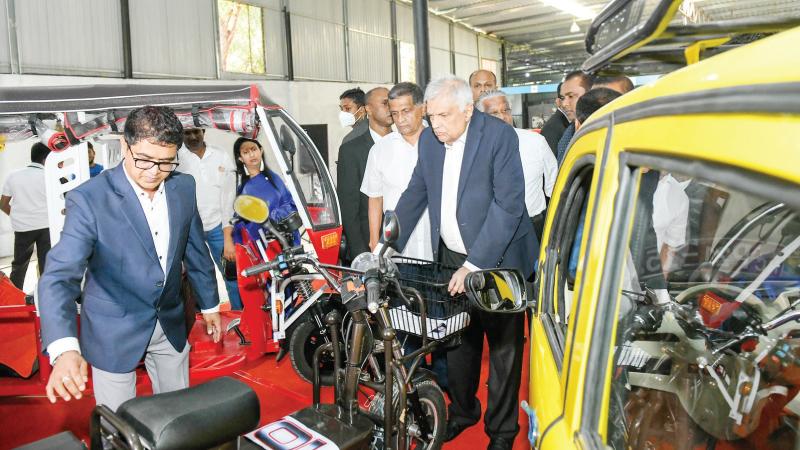
Electric Vehicles (EVs) are more suitable for Sri Lanka which spends a significant amount (around US$ 6 billion) on the import of fossil fuel annually. While EVs are common the world over, it has been a mere concept in Sri Lanka to date, with only a few hundred privately imported Nissan Leafs and Tesla Model S cars doing the rounds in Colombo.
However, the Government is now taking steps to make it a more practical solution by adding EV buses to the country’s public transport system. The relevant Cabinet Paper was approved last month. Commenting on the move, Minister of Media, Transport and Highways Dr. Bandula Gunawardena said the EV bus project is being introduced to reduce the import costs of fossil fuel such as petrol and diesel. The buses will use solar power for charging the electric batteries and the pilot project is set to be launched in Colombo and its suburbs and later, in other areas of the Western Province.
“System Change”
He said the intention of the Government is to create a true “System Change” through the process of fully converting to EV use. Electric buses can be regularly seen in many other world capitals.
President Ranil Wickremesinghe has also taken steps to implement a concept to raise Sri Lanka’s economy to international standards through a “Green Energy” economy within the next five years. He disclosed this while attending the opening ceremony of the Minneriya Volta Auto Tech Engineering Institute on March 2. The company will allow the public to purchase EV tractors, motorcycles and three wheelers assembled in Sri Lanka. The President during the visit extended his fullest support to the company’s expanding operations.
“Steps being taken to create a Green Energy economy are appreciated and everyone should work to shift the country’s economy to a Green Energy economy by implementing such projects. As the rest of the world is moving towards a Green Energy economy, Sri Lanka has also embarked on the same path,” he said.
 As yet another step to strengthen the Government’s resolve it has been decided to deploy 1,000 electric buses countrywide in order to strengthen public passenger transport in Sri Lanka. As the first step, 200 buses will be deployed in Colombo and suburbs, according to Sri Lanka Transport Board (SLTB) Chairman Engineer S. M. D. L. K. D. Alwis.
As yet another step to strengthen the Government’s resolve it has been decided to deploy 1,000 electric buses countrywide in order to strengthen public passenger transport in Sri Lanka. As the first step, 200 buses will be deployed in Colombo and suburbs, according to Sri Lanka Transport Board (SLTB) Chairman Engineer S. M. D. L. K. D. Alwis.
“Steps have been taken to strengthen the SLTB as a State-owned passenger transport service. Although there are about 6,000 SLTB buses, on average a bus cannot run for more than 15 years. In any case, this situation requires a huge public project for a large-scale transport industry like SLTB. Therefore, a project to add 1,000 electric buses to the SLTB has been initiated. As the first step, 200 buses will be imported,” he said.
Alwis said the next 50 and 75 buses will be imported thereafter in the next stages. “It is now planned to deploy these buses on 10 main routes. Accordingly, Kadawatha Nittambuwa and Kadawatha Gampaha, Katunayake / Negombo to Colombo as well as from Panadura to Negombo and Piliyandala to Kadawatha routes will receive these buses on a priority basis,” he said.
Public-Private Partnership
“Since one bus is priced between Rs. 70 to 80 million, the project will be implemented under a Public-Private Partnership (PPP). The establishment of electric bus charging stations and the generation of electricity from solar panels at SLTB depots and the provision of that electricity to the Ceylon Electricity Board (CEB) are also being implemented as part of this project,” he said.
As a similar project, the conversion of three-wheelers into electric three-wheelers was implemented in Sri Lanka under the United Nations Development Program (UNDP). This initiative is led by Additional Secretary, Environmental Development Dr. Sunimal Jayatunga.
He said that as a result of the reduction of toxic fumes released into the environment by the burning of fossil fuels, environmental pollution will be reduced to a minimum. He also said that spending a significant amount of foreign exchange on fuel can also be reduced. He emphasised that Sri Lanka should work to mitigate Climate Change by implementing a Green Energy concept. For that, he says, attention must be paid to environmentally friendly alternative energies, especially renewables such as solar and wind.
Sri Lanka was able to take another step in moving forward towards the electrification of its vehicle fleet last week with the registration of the first electric three wheeler and the first electric supercar assembled in Sri Lanka. Minister Dr. Gunawardena and Commissioner General of the Department of Motor Traffic Nishantha Indika Anuruddha participated.
The Vega EVX was thus registered as Sri Lanka’s first home-grown fully electric supercar. The number assigned to it was WP CBO 2021. The registration license plate of the vehicle was handed over to Harsha Subasinghe of VEGA Innovations in the presence of Transport Minister Dr. Gunawardena. The Vega EVX is a fully electric vehicle designed and built in Sri Lanka. It is equipped with a 40 kilowatt battery system and has a capacity of 750 horsepower (hp). It has also been exhibited at several car shows abroad.
Supercharging
Industry experts have also called for a proper DC supercharging infrastructure to facilitate the conversion to EVs and also for the training of technicians who can repair EV batteries and vehicles. They have also called for a proper procedure for the safe disposal of end-of-life EV batteries.
